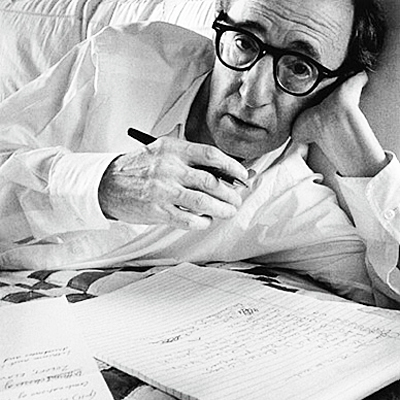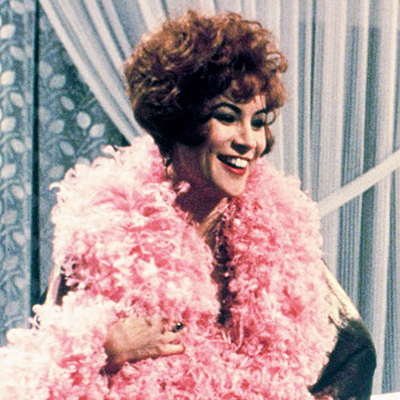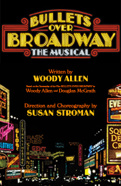Charmed! Follow Bullets Over Broadway’s Journey From the Silver Screen to the Great White Way
The new musical Bullets Over Broadway features an irresistable mix of gangsters, sex and splashy song-and-dance numbers, all set against the fizzy backdrop of 1929 New York. And guess what? The story behind its arrival to the boards is pretty juicy, too—and it also involves gangsters! Read below to find out how Woody Allen’s 1994 comedy became an all-star affair at Broadway’s St. James Theatre, directed by Susan Stroman and starring Zach Braff, Marin Mazzie, Betsy Wolfe, and Vincent Pastore.

Bullets Started as a Game of Telephone
Screenwriter Douglas McGrath was introduced to Woody Allen through a mutual friend, who kept inviting McGrath to dinner to meet the legendary fillmmaker. The two men hit it off, and Allen then asked his friend if McGrath would like to try writing a screenplay together. At first, McGrath was hesitant. “I told her to tell Woody that if he was trying to use me to get ahead in the movie business, I wasn’t so sure I wanted to let him dine with me again,” McGrath said. “Then she hit me with a polo mallet, and I said yes.”

The Movie Evolved From a List
McGrath and Allen’s early meetings consisted of lots of brainstorming. Sometimes the two would make lists or talk movies. (FYI: Woody can’t stand The Wizard of Oz. What?!) Bullets Over Broadway emerged, but so did two other Allen movies: Small Time Crooks and The Curse of the Jade Scorpion.

Woody Thought the Plot Was Cliche
In an interview with Swedish director and film critic Stig Bjorkman, Allen admitted that the idea of a gangster trying to get his girlfriend into a show “was not too original.” What appealed to him was the younger gangster Cheech emerging as a more talented writer than the playwright—this convinced Allen to move ahead.

Creativity Thrived Amidst Chaos
McGrath and Allen’s collaboration started in January 1993, when Allen’s personal life was screaming headlines for the tabloids: Mia Farrow, Soon-Yi, you know the drill. Throughout this trying time, Allen focused on shaping Bullets Over Broadway, tirelessly pitching ideas between sober phone calls to lawyers and his family. “OK,” Allen said to McGrath after a series of legal interruptions. “Let’s get back to work on our little comic bauble!”

Dianne Wiest Almost Didn’t Speak
When Woody Allen approached his friend and frequent collaborator Dianne Wiest about playing the role of Helen “Don’t speak!” Sinclair in the new film, she was thrilled—until she read the script. “She said, ‘I can’t do this, this is not for me,’” Allen explained. “It took me a couple of talks to convince her.”

Bullets Was Made on the Cheap
Although the film takes place during the decadent Roaring Twenties, Allen’s movies are strictly low budget, and Bullets Over Broadway was no exception. To avoid overtime costs, the film's opening night party scene, originally planned to be filmed at night in Central Park, was changed to a restaurant.

Some of the Mobsters Were...Authentic
While watching early footage of the film with Allen, McGrath remarked how authentic one of the gangsters looked. “Oh, we were lucky to get him,” Allen replied. “He was just sprung.” The main cast is a collection of A-listers, who as far as we know, have no mob ties: John Cusack as morally beleaguered playwright David Shayne, Dianne Wiest as aging drama queen Helen Sinclair, and Chazz Palminteri as the surprisingly eloquent Cheech.

The Critics Loved It
Released in October 1994, Bullets Over Broadway didn’t exactly rake in the cash, eventually making $13.4 million domestically. (But take Allen’s tiny budget into account, and it’s a Capone-like haul!) More importantly, critics adored the frenetic backstage comedy. “Mr. Allen has drawn on autobiographical specifics in other films, but this may be the one in which he speaks most seriously from the heart,” Janet Maslin wrote in The New York Times.

...And So Did the Oscars (Kinda)
The movie garnered seven Academy Award nominations, including Best Picture, Best Original Screenplay, and Best Director. Wiest won the movie’s lone Oscar, beating out co-star Jennifer Tilly, playing Olive Neal, the talent-immune gangster’s girlfriend, for Best Supporting Actress. (And to think Wiest first thought she couldn’t pull off the role!)

Woody Stood in the Musical’s Way...
Bullets' arrival on the Great White Way was discussed for years, but Allen continually put the breaks on the idea. Why? “He hates the new music, the new composers for shows,” Allen’s producer (and sister) Letty Aronson told The New Yorker. Hmm. That is a problem, isn’t it? When Aronson mentioned that existing 1920s-era music could be used instead, Allen began to change his tune.

...But Stro Changed Woody's Mind
Things got better when Allen met with Susan Stroman at his Upper East Side townhouse, where his children’s playroom served as a makeshift conference room. Allen was immediately floored by Stroman's knowledge of the American songbook. “She knew them all,” he said, “And knew songs that even I didn’t know.” During rehearsals, Stroman would later report, “Woody was very happy. He would spontaneously applaud—but quietly, under the table.”

Marin Mazzie Almost Didn’t Get the Part
Tony winner Marin Mazzie had to fight for over a year to win the role of the boozy diva on Broadway. After auditioning for the creative team, Mazzie recalled, “[Allen] didn’t say anything, but just the experience of him being there was nerve-wracking.” After initially being told she didn’t get the part, Mazzie went in for more auditions. After beating out the competition (including Patti LuPone), Mazzie finally scored the role.

Bullets Is a Dream Come True
Woody Allen may not have always envisioned his film on stage, but headliner Zach Braff, who made his film debut in Allen’s dark comedy Manhattan Murder Mystery as a teenager, is thrilled to make his Broadway debut in the filmmaker’s newest venture. “My true dream, more than anything, is to star in a Broadway musical,” Braff told Broadway.com. “And then this perfect storm happened that was Woody Allen, Susan Stroman, and all the stars aligned, it was just a no-brainer. I was like, ‘Wow, when can we start?’” April 10 at the St. James Theatre, Zach!



